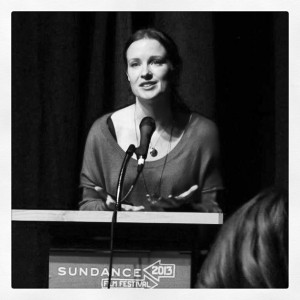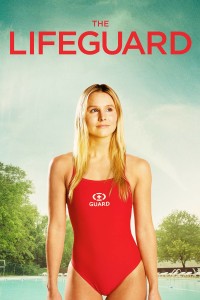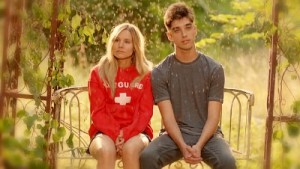Garcia ’99 Talks About Her Film The Lifeguard, in Theaters Aug. 30

Liz Garcia ’99 is the director, screenwriter, and co-producer of The Lifeguard (Focus World and Screen Media), in which a young woman (Kristen Bell, Veronica Mars) nearing 30 quits her Associated Press reporting job in New York and returns to her childhood home in Connecticut. She gets work as a lifeguard and has an affair with a troubled teenager (David Lambert), the son of a co-worker.
The film’s also stars Mamie Gummer, Martin Starr, Alex Shaffer, Adam LeFevre and Joshua Harto, who also is a co-producer (and Garcia’s husband).
The Lifeguard premiered at the Sundance Film Festival last January and was released in late July for viewers to rent on iTunes and a number of cable video-on-demand systems. The movie has its big screen release on Aug. 30 in 15 cities.
In this Q&A, Associate Director of Publications David Low interviews the multi-talented Garcia, who also has worked as a writer, director, and producer on several television series, including Cold Case and Memphis Beat, which she created with Harto.
Q: What inspired the script of The Lifeguard?
A: I worked as a lifeguard at a pool when I was in high school and on break from Wesleyan, and it was a job and environment I always wanted to tell stories about. I just wasn’t sure exactly how. But I loved the feeling of the quiet pool, and what it was like to observe peoples’ lives, families, and couples, while sitting in that chair. I noodled over the idea of a lifeguard who was an overachiever and thought she knew how life was to be lived intersecting with some lost teenage boys at the pool, and I let that idea grow. Then it converged with the idea of facing adulthood, of turning 30, and when I knew that this would be about a young woman returning to the dream job of her youth, the story came together quickly.

Q: What were some of the major challenges you faced directing your first film?
A: The challenges I faced making The Lifeguard were really the challenges faced by any director on any movie—not enough resources, not enough time. I imagine even those with all the days and all the money you’d want still feel rushed, but we certainly didn’t have everything we wanted, and being rushed was our reality. Fortunately, the bulk of my experience is in television production where you move quickly, so I was as prepared as one could be to have to know what I wanted and be able to work quickly under pressure. A unique challenge we faced in shooting in Pittsburgh during the summer was the lack of night. Typically you’re chasing the light, racing against the sun, but in this case, we were trying to hide from the sun because we had so many night scenes and only about five hours of darkness.
Q: What was it like to work with Kristen Bell and the rest of the cast?
A: I was so lucky to work with this cast. They were not only my dream cast for the particular parts, but they were fun and supportive and trusting. We had such a slim margin for error, had any of our cast been unprepared or diva-ish, we really would have been in trouble. But these guys were really tough and didn’t complain, and Kristen, in particular, was remarkable because she worked long days and was in her first trimester during our shoot.
Q: The Lifeguard premiered at Sundance. What was that experience like?
A: Finding out we got into Sundance was one of the most glorious moments I’ve experienced. I did the whole screaming and jumping and crying thing. I had had a very specific goal of getting into Sundance and being in that way associated with some of my favorite filmmakers—David O. Russell, Steven Soderbergh, Nicole Holofcener—so I was over the moon when the goal was realized. The experience at the festival was really quite surreal, particularly because like most people there I got the Sundance flu, a combination of exhaustion, altitude sickness, and stress-induced cold. It was wonderful and very cool to be able to show the film so many times and answer questions and interact with the audience. And Sundance is a remarkable institution, quite supportive and quite progressive.

Q: Your film was released on iTunes and video-on-demand before it appears in theaters. How do feel about that?
A: I love the new model of distribution. It’s much more equal opportunity than the old model. Our film is opening in theaters in 15 cities, and if it does well it will grow from there. But if it doesn’t, we would only be reaching those 15 cities. Now, with the digital model, people all over the country in big cities and small towns can watch. This is my goal as a filmmaker—to make films that reach people. And The Lifeguard is a film with universal themes, about fleeing the city for a small town, so I want people in suburbia and beyond to be able to watch the film and relate. This is a film for them, not just for New Yorkers.
More and more, the movie theaters and the old distribution model are reserved for gigantic four-quadrant movies, and they’re edging out the smaller theaters and the smaller films. So thank goodness for the digital model where the power is in the hands of the person who holds the remote control or the laptop or even the phone. Of course, I have reservations about the film actually being shrunk down to the point where the image is small enough to fit on an iPad or a phone. Of course, I do. But the reality is that younger people are watching film and television that way. So I can’t be a stick in the mud. I have to go with the flow and realize that at some point there will be a satisfying intersection of aesthetic quality—the kind we experience on a big screen—and portability and ease.
Q: Do you plan to work on another television series soon?
A: My husband Joshua Harto and I work together on almost everything. We write television together. We use one medium as the antidote to the other. Television development has been, in our experience, enormously creatively gratifying. You pitch a pilot, write it in three months, and create a whole new world in so doing. The downside is that it so rarely gets made. So you have 60 great pages, but that’s it. With The Lifeguard, we were our own bosses and we made the thing. It got out there! That was the best experience of my life. But it doesn’t pay what television does. And it may not reach as many people as television does. So we’ll continue to throw our hats into both rings, bouncing back and forth to try to get that coveted creative experience—supporting oneself while creating art that makes you proud.
Q: What is it like being a woman director in the male-dominated film industry? Do you see yourself as agent of change?
A: As a member of a minority in Hollywood, a female director, I unabashedly see myself as an agent of change. I know how important it was to me when I was considering this career, when I was coming up in this career, to see other women doing it, and I want to give that back to other women who want this. I try whenever I have a platform to be honest about the fact that this business is still sexist. That content for women and by women is not considered as important or as prestigious or as universal as that by and for men.
I have to speak up about that because I couldn’t live with myself otherwise—the whole “there’s a special place in hell for women who don’t help other women” thing, but also because I believe there are so many good-hearted men in this business who don’t want to perpetuate sexism and who need to be reminded that they are in positions to help because then they will. Then they’ll think twice before they make a directors’ list or a writers’ list with only men on it. Or they’ll think twice before they wonder if a woman can handle a big budget or handle a difficult A-list actor.
My experience in this business has shown me that, and I’ll be generalizing about how the sexes are different here, but I stand by this: Women have natural advantages and I’d like those to be considered as a positive. I’m able to keep my ego out of the way, and keep my cool in the face of on-set conflict where men might get into an unnecessary battle. I can be emotionally supportive for actors and let them feel safe being vulnerable because I’m allowed to and I’m comfortable with showing empathy and tenderness. And because I reserve my anger for special occasions, when those special occasions occur, let’s just say they’re very, very special, and my message travels far, fast.
Q: Do you feel your time at Wesleyan has influenced your career choices?
A: My Wesleyan education is with me every day in decisions I make about my career, about parenting, about what sort of citizen I am in the world. Wesleyan reinforced the values I was taught in my home about tolerance and progressiveness. Specifically, Wesleyan and my American Studies major and my classes with Richard Slotkin about how the American story has been scripted in film gave me the specific tools to recognize how progressive values are perpetuated or—in more instances—challenged by popular culture. I am in the business of making popular culture. So I wear a heightened awareness when I create, and I carry and treasure my responsibility to that awareness. I don’t operate in stereotypes or sexism.
And studying with Jeanine Basinger not only taught me my craft but has offered a touchstone for those tough times in this business when I’m not sure how to be who I want to be, or if I can be the artist I want to be in this business. Jeanine taught us how these great directors were true to themselves and used the medium to express who they were. She also showed us the films where they failed to do that, and it all added up to a map for us. I have dreams about Jeanine and Martin Scorsese, whom we studied in Jeanine’s senior seminar. I’m not kidding. When I’m lost, I will dream up advice coming from those two. Advice about not being afraid to fail, about careers being long and riddled with mistakes and triumphs, about actively practicing your craft each day. So to say that Wesleyan is with me every day is actually an understatement. Wesleyan is with me day and night.
Watch the movie’s trailer:
[youtube]http://www.youtube.com/watch?v=Qfd85vtmUa0[/youtube]

